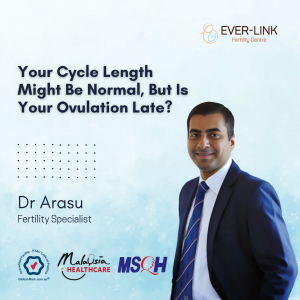
If your period shows up every 28–30 days like clockwork, you might think everything is working perfectly when it comes to your fertility. But here’s something many people don’t realize, even if your cycle length looks normal, you could still be ovulating later than expected and that can make a big difference, especially if you’re trying to conceive. Let’s take a closer look at why the timing of ovulation within your cycle matters just as much as the overall length.
The Menstrual Cycle Basics
Your cycle has two main parts:
- Follicular Phase: starts on the first day of your period and ends at ovulation
- Luteal Phase: begins after ovulation and ends when your next period starts
The luteal phase usually lasts around 14 days, so if your cycle is 28 days long, ovulation typically happens around day 14. But not everyone follows this “textbook” pattern.
What Happens with Late Ovulation?
Sometimes the first phase (follicular) gets stretched out due to stress, illness, diet changes, or hormonal shifts. This means:
- You still get your period regularly, say every 30 or 32 days
- But ovulation may not happen until day 18, 20, or even later
So if you’re aiming to conceive and only targeting “day 14,” you could easily miss your fertile window.
Why It Matters for Fertility
Late ovulation can:
- Make timing intercourse tricky, since the fertile days shift
- Affect egg quality in some cases
- Shorten the luteal phase if your overall cycle doesn’t adjust, which may make implantation harder
Even when everything else looks “normal,” this small shift can impact your chances of getting pregnant.
How to Know When You’re Actually Ovulating
Your period alone won’t tell you when ovulation happens. But these tools can:
- Ovulation predictor kits (OPKs): detect the hormone surge right before ovulation
- Basal body temperature (BBT): small rise in temperature confirms ovulation just occurred
- Cervical mucus tracking: clear and stretchy = most fertile time
- Hormone blood tests or ultrasound: helpful if you need a clearer picture
Just because your cycle seems regular doesn’t mean ovulation is happening “on schedule.” And if you’re trying to conceive, understanding your personal ovulation timing can make all the difference. Trust your body, pay attention to its signals, and don’t hesitate to track your cycle more closely. A few extra days of knowledge can go a long way on your fertility journey.

